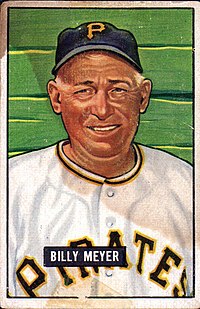| Billy Meyer | |
|---|---|
 Meyer as depicted in a baseball card by Bowman Gum, 1951 | |
| Catcher / Manager | |
| Born: January 14, 1893 Knoxville, Tennessee, U.S. | |
| Died: March 31, 1957 (aged 64) Knoxville, Tennessee, U.S. | |
Batted: Right Threw: Right | |
| MLB debut | |
| September 6, 1913, for the Chicago White Sox | |
| Last MLB appearance | |
| September 18, 1917, for the Philadelphia Athletics | |
| MLB statistics | |
| Batting average | .236 |
| Home runs | 1 |
| Runs batted in | 21 |
| Managerial record | 317–452 |
| Winning % | .412 |
| Stats at Baseball Reference | |
| Managerial record at Baseball Reference | |
| Teams | |
| |
| Career highlights and awards | |
| |
William Adam Meyer (January 14, 1893 – March 31, 1957) was an American baseball player and manager. He holds the dubious distinction of having played with, then managed, two of the worst teams in the history of Major League Baseball.
A catcher who spent most of his 19-year active (1910–1928) playing career in the minor leagues, he threw and batted right-handed, and was listed as 5 feet 9 inches (1.75 m) tall and 170 pounds (77 kg).
Meyer broke into the majors with the 1913 Chicago White Sox, though he appeared in only one game. Three years later, when he returned to the American League with the Philadelphia Athletics in 1916, he appeared in 50 games for a squad which won only 36 games and lost 117. The following year, he played in 62 games for an improved A's club which, however, still posted a 55–98 mark.
Then, a generation-and-a-half later, Meyer managed the 1952 Pittsburgh Pirates to the third-worst record in modern National League history, the Bucs winning only 42 of 154 games.
However, during the period from 1932 through 1947, Meyer was a highly successful minor league manager, helming high-level teams in the New York Yankees' organization and winning four playoff championships. In addition, in 1948, Meyer's first season at the helm of the Pirates, he was selected The Sporting News Major League Manager of the Year,[1] after he led the Bucs to a surprising first-division finish.